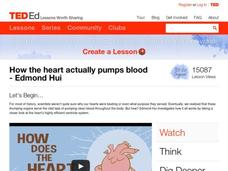TED-Ed
Biodiesel: The Afterlife of Oil
Use this slick video to introduce your environmental scientists to the wonders of biodiesel. They will learn about problems caused by our waste oil, how it can be recycled, and other benefits of using biofuels. Use the video, assessment...
TED-Ed
Radioactivity: Expect the Unexpected
Several radioactive concepts are explained with the help of animated atoms, complete with their own facial expressions. As physical science pupils watch, they learn about gaining or losing atomic particles, alpha and beta particles, and...
TED-Ed
How Polarity Makes Water Behave Strangely
Water is common? Not really! Learn how the polarity of the water molecule gives it tremendous properties that make is quite unique in the universe. Learners will understand surface tension, adhesion, and cohesion, as well as why these...
TED-Ed
The Science of Macaroni Salad: What's in a Molecule?
After showing they quick-paced featurette on the breaking of bonds, hold a discussion using the accompanying Think questions. Complex molecules are broken down into smaller molecules during digestion. There are six main molecules that...
TED-Ed
The Science of Spiciness
Spice up a nutrition, biology, or cooking class with this hot topic: the science behind the spiciness of many beloved foods. There are actually two different types of spice, depending on the chemical compound causing the pain:...
TED-Ed
Where We Get Our Fresh Water
This fresh resource explores the world's fresh water: where it can be found, and how humans use it. You might be surprised at the variety of domestic uses! Short, but sweet, this feature can be followed by a class discussion using the...
TED-Ed
An Athlete Uses Physics to Shatter World Records
Have you heard of the Fosbury Flop? It was invented by a college high jumper in and has become the standard technique for high jumpers world wide. Learn the physics of this move and why it is more effective for clearing the bar than the...
TED-Ed
Poison vs. Venom: What's the Difference?
Did you know that poison and venom are not the same? Both are toxic, but poison must be inhaled, ingested, or absorbed, while venom must be injected into a wound. The narrator explains that some toxic compounds may be used for good, as...
TED-Ed
Does Stress Cause Pimples?
After this video, make sure to give a pop quiz on pimples! The question that is answered is whether or not pimples are caused by stress. Stress hormones give our bodies what we need for a fight or flight, but what happens if we don't do...
TED-Ed
How Do Nerves Work?
This lesson won't get on your nerves! Find out how one kind of cell can cause comfort, terror, or pain in your brain. Comic strip and cartoon style animation is used to help explain the transmission of electrical nerve impulses and the...
TED-Ed
How Does Work...Work?
What makes a clock tick or a bulb light up? The concept of work is explained to a backdrop of clever animation. Physics fans learn that the amount of work equals the product of the force and distance, and that the rate equals the amount...
TED-Ed
Climate Change: Earth's Giant Game of Tetris
In this colorful animation, our current problem with climate change is likened to a block-stacking game of Tetris. Greenhouse gases are increasing in the atmosphere at an increasing rate. Can we place them properly before it's too late?...
TED-Ed
How Tsunamis Work
A flood of information about tsunamis can be learned by viewing this feature. How do they get started? How fast do they travel? How high can they rise? The answers to these questions, plus a little bit of history, are given for your...
TED-Ed
Sugar: Hiding in Plain Sight
Did you know that you can find added sugars in three-quarters of the foods you find in grocery stores? Invite your learners to consider how much sugar exists in the food products we eat on a day-to-day basis, as well as to learn about...
TED-Ed
How Pandemics Spread
An eerie hand-drawn-style animation narrates how diseases are dispersed on a global scale. Although the content can strike fear in the hearts of viewers, it ends by noting how science has provided a way to minimize impact by identifying...
TED-Ed
Nature's Smallest Factory: The Calvin Cycle
Explain the two-step process of photosynthesis to your high school biologists with a focus on the Calvin cycle. Using adorable animation, a video likens the cycle to a tiny, sustainable factory. Even though the enzyme-bird rubisco...
TED-Ed
The Science of Attraction
Chemical attraction? Yes! High schoolers will be fascinated by the science behind the romantic feelings. They may be surprised that the eyes act first, drawing us to take a closer look, and the nose acts next, sensing major...
TED-Ed
How the Heart Actually Pumps Blood
Let your heart rejoice! A unique video explains in detail how the heart works to transport blood throughout the human body. Use it during your human body unit, and then discuss the accompanying comprehension questions as a review of the...
TED-Ed
The Science of Symmetry
No matter which way you slice it, the definition of symmetry might not be clear. The narrator of the video reflects on its true meaning as shapes, plants, and animals dance onstage for a captivated cartoon audience. Your class will be...
TED-Ed
Cell vs. Virus: A Battle for Health
Viruses act as alien invaders, but our cells are usually quite effective at counterattack. With cartoon animation, viewers learn how DNA is the mastermind behind making antibodies. Immunity rules in this land!
TED-Ed
Why is Ketchup so Hard to Pour?
Shake and shake the ketchup bottle, none will come, and then a lot will pour out! Finally, a scientific answer to the age-old question of why it is nearly impossible to get this coveted condiment out and onto your french fries! Along the...
TED-Ed
How to Speak Monkey: The Language of Cotton-Top Tamarins
Tamarin monkey language can be categorized by stem upsweep, duration, peak frequency, and frequency change. Although other complex terminology is used to describe the 38 calls of this species, the video is easy to follow and a...
TED-Ed
A Digital Reimagining of Gettysburg
Why would Robert E. Lee order Pickett's Charge, an action that changed the course of the Civil War? Geographer and historian Anne Knowles uses digital technology to explain what she thinks is the missing piece in trying to understand...
TED-Ed
Tycho Brahe, the Scandalous Astronomer
Who says scientists are boring geeks? Certainly not the narrator of a short video who dishes up the scandals associated with Tycho Brahe, a Danish scientist and alchemist (now that's two labels you don't often see together) who used...
Other popular searches
- Educational Technology
- Educational Videos
- Educational Software
- Educational Career Resources
- Educational Site
- Educational Television
- Educational Toys
- Educational Statistics
- Educational Games
- +Educational +Toys
- Educational Web Directories
- Educational Goals























